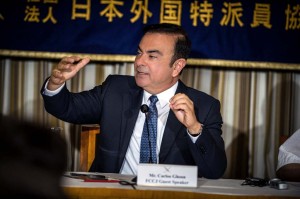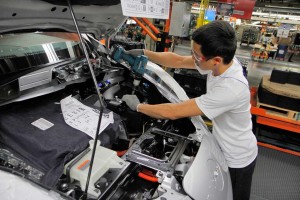
Nissan denied reports that it is considering cutting back on its EV-related production that has been a key component of CEO Carlos Ghosn's tenure.
Nissan officials dismissed speculation that it was preparing to scale back production at its battery plan in Smyrna, Tennessee.
Nissan spokesman Travis Parman said in an e-mail the company have no plans to make any changes in its ambitious electric vehicle program. The program has been a signature initiative of Carlos Ghosn, the chief executive at both Renault and Nissan.
“The Renault-Nissan Alliance remains 100% committed to its industry-leading EV program. This global commitment continues for the foreseeable future, and we have not taken any decision whatsoever to modify battery sourcing allocation,” Parman wrote.
Parman added that Nissan has no plans to impair its battery investments.

A Nissan Leaf rolls down the new assembly line in Smyrna, Tennessee. The company's battery plant is next door.
Recent reports by Reuters that originated in Europe indicated that the Renault-Nissan alliance is in the process of re-evaluating its battery production strategy. One proposal under consideration calls for curtailing production at Nissan-operated battery plants in the England and the United States and purchasing electric vehicle batteries from the Korean company LG Chem, according to Reuters.
The reports may have gained steam because sales of “alternative” fueled cars in the U.S. are down 3.6% through August, according to Experian Automotive. It’s the first time since 2009 those vehicles have slumped. This has happened, in part, because gas prices have stabilized and the fuel efficiency of cars and trucks has improved significantly in the last few years.
“There are many different options for consumers to choose from to power their cars. Electricity and pure battery cars have some advantages but also major hurdles to win over consumers,” said Art Wheaton, an automotive industry expert at Cornell University, in a recent report.
Wheaton added that without a significant catalyst, such as expansion of the range, bigger tax incentives or lower pricing, his outlook for EVs is unlikely to change.
(New Nissan Leaf buyers getting free charging. For more, Click Here.)
However, the Leaf seems to be immune to the sales downturn this year. Parman said that sales of the Leaf electric vehicle in the U.S. have now set records for 18 consecutive months and sales are up 34% through August. In addition, Leaf sales have topped 3,000 units in three of the last four months, and August was the best month since launch with 3,186 sales, Parman said.
Nissan also is stepping up promotion of the Leaf through a “No Charge to Charge” incentive, which offers two years of no-cost charging to new Leaf buyers in 11 markets, to 14 more markets by the middle of next year.
(Click Here for details about Citroen’s 141 mpg show car.)
The automaker also has helped install more than 650 quick chargers in markets across the U.S., and has plans to work with partners on 500 additional quick chargers in the next year, Parman said.
(To see Nissan’s new Leaf-based electric shop truck, Click Here.)
Nissan’s Tennessee battery plant opened in the spring of 2013 and is the largest lithium-ion automotive battery plant North America and the only plant controlled by a car manufacturer. The heavily automated plant covers 475,000-square feet and is capable of making as many as 200,00 batteries annually.
The battery plant sits next to the Nissan assembly plant in Smyrna, which was retooled in 2012 to accommodate production of Leaf. The Leaf is manufactured on the same line as Altima and Maxima so volume can readily be adjusted among the vehicles to meet demand.
